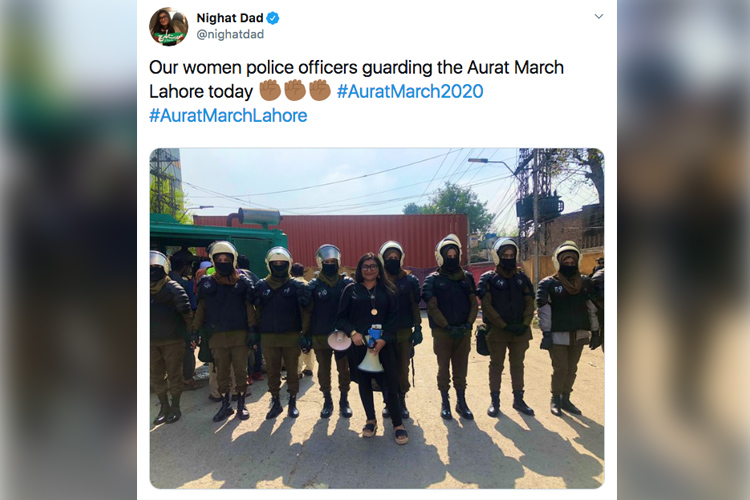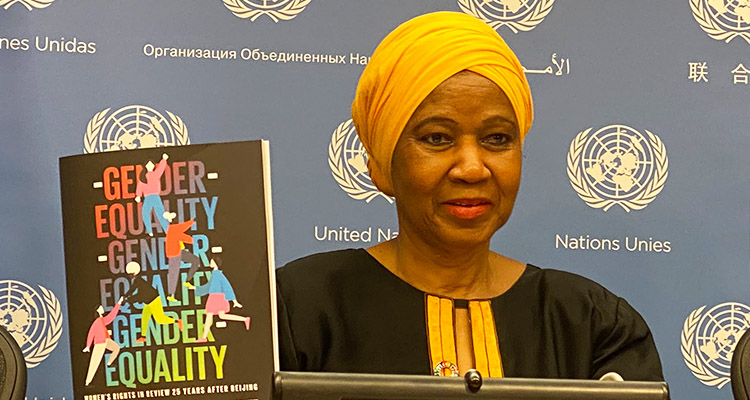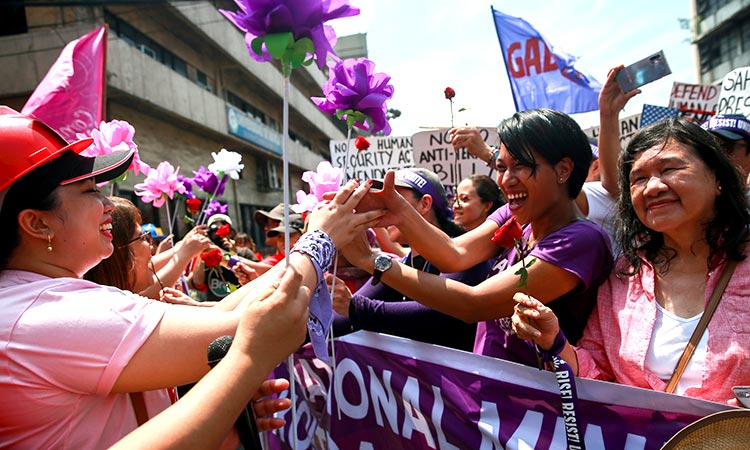VIDEO: Hardliners hurl stones and shoes at Women's Day marchers in Pakistan

Activists of the 'Aurat March' hold placards during a rally to mark International Women's Day in Lahore. AFP
Sahar Ejaz
Amid femicides, honour killings, sexual assault, domestic violence and loss of agency, the fearless women of Pakistan take to the streets with loud and clear voices of protest fuelled by the right to personal autonomy on International Women’s Day 2020, March 8.
In Islamabad, hardliners pelted campaigners with stones, shoes and sticks as they marched through Pakistan's capital on Sunday to mark International Women's Day.
Women and men joined the event in Islamabad, the largest such rally in the country, for what is known in Pakistan as the Aurat March, using the Urdu word for women.
Ever since its initiation in 2018, the ‘Aurat March’ (Women March) has become the country’s idiosyncratic platform for women empowerment and visibility across all spheres of life – touching home, work and public spaces – reinforced via eye opening placards.
In commemoration of International Women’s Day, Prime Minister Imran Khan reiterated support for the occasion in a press release that read: “It is indeed encouraging to see that our women are proving their mettle in every walk of life and achieving excellence in their respective fields at national and international level.
“I firmly believe that inclusive and sustainable socio-economic development can only be ensured by providing equal opportunities and a conducive environment to our women. I reaffirm my pledge on this day to take all measures that would help our women to lead a safe, secure and prosperous life.”
Pakistani lawyer and activist Nighat Dad poses flanked by women police officers safeguarding the 'Aurat March' rallying grounds in Lahore, Pakistan.
Finding leverage in Karachi then gradually amassing support from major cities like Lahore, Multan, Faisalabad and Larkana over time, the revolutionary march is to flood the capital, Islamabad, this year inclusive of other cities.
With the mission and vision of Hum Aurtein – the collective feminist body behind the march – resonating among thousands of Pakistani women, nationwide media coverage has broadcasted the movement to every nook and cranny of local households, forcing introspection, challenging primitive narratives and inviting uncomfortable yet much-needed discourse about the marginalised gender.
The path to equality becomes riddled with obstacles when every individual rallies for the concept on their own terms.
READ MORE
Proposed New Zealand abortion law to give women right to choose
India abusing lawless detention act in Kashmir says rights group
UAE helps empower Rwanda women
Channels of communication fraught with cultural stigma and taboo have seemingly opened, a sliver of leeway, to allow discussions on women’s bodily autonomy – the right to exercise agency over her own person – heralded by the movement’s thematic slogan of ‘Mera Jism, Meri Marzi’ (My Body, My Choice).
Needless to say the slogan sparked debates on grounds of propagating irreligious feminist ideology from the west, naturally deemed incompatible with Pakistan’s conservative constitution.
The barrage of whitewashing claims overlooks the heart of the issue: ritualistic suppression of women and girls writ in tradition warrants dissection at once.
It does not need further justification that numerous lives can be saved if society stands in solidarity with its women – women who are at times child brides, victims of sexual harassment, killed in the name of honour, forced out of education, the list goes on.
While religio-political disfavour continues to brew aggressively on the sidelines, there is no denying that the ‘Aurat March’ is bringing pressing issues previously dormant to the forefront that are crucial to Pakistan's internal and external progress.
Sahar Ejaz is an intern at Gulf Today. She covers Culture, Arts and social issues.








